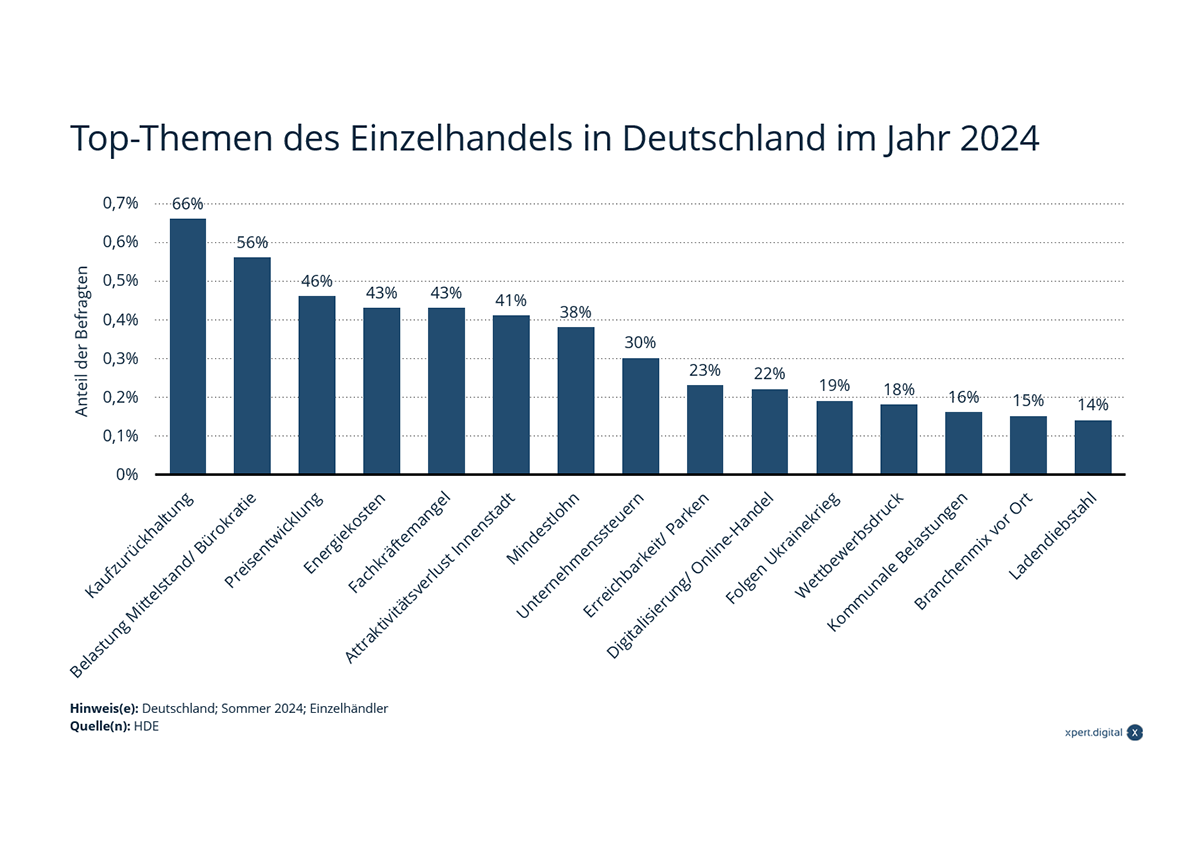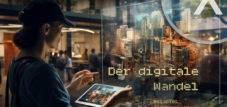
2024 - Challenges and top topics in retail - including shortage of skilled workers, minimum wage, bureaucracy and digitalization - Image: Xpert.Digital
📈 Overcoming economic burdens: Germany's retail sector faces new challenges
🌐 The retail landscape in Germany is facing a variety of challenges and opportunities. The key issues shaping the sector range from economic stress to structural changes. Given the increasing complexity and dynamics of these challenges, it is crucial to find innovative solutions to future-proof retail. This text discusses the main topics of retail in Germany in 2024 and shows innovative approaches and solutions to master the topics of automation, flexibility and scalability.
💼🌀 Economic burdens and bureaucracy
A key issue weighing on the retail sector is consumer reluctance to purchase, which is exacerbated by economic uncertainty and rising costs of living. This reluctance is reflected in a scale of 66%, indicating a significant challenge. A possible solution could be the introduction of loyalty programs that offer consumers incentives to increase their spending. Such programs could be personalized through the use of big data to meet customers' specific needs and preferences.
In addition, the burden of bureaucracy on medium-sized businesses represents a significant challenge (56%). Automation and digital solutions could make a significant contribution to relieving the burden here. For example, implementing AI-powered compliance tools could reduce bureaucratic requirements while increasing efficiency.
💸⚡ Price development and energy costs
Price trends remain a critical factor, influenced by rising energy costs (43%) and general inflation. To address these challenges, retailers could shift to sustainable energy solutions, such as installing solar panels on their buildings. This would not only reduce energy costs, but also strengthen the brand image in terms of sustainability.
In addition, the introduction of dynamic pricing models based on market conditions could enable flexible pricing. Such models could be optimized through machine learning and real-time data analysis to both maximize revenue and provide value to customers.
👩💼🔧 Skilled labor shortage and minimum wage
Another pressing issue is the shortage of skilled workers (43%), which is exacerbated by demographic change and increasing qualification requirements. To mitigate this problem, retailers could invest more in the training and development of their employees. E-learning platforms and blended learning approaches could offer a flexible and cost-effective solution.
In addition, the introduction of a flexible working time model could help to attract and retain qualified employees. These models could be supported by the use of automation tools that make workforce planning and management more efficient.
🏙️🔗 Loss of attractiveness of city centers and digitalization
The loss of attractiveness of city centers (41%) is another central issue that is being exacerbated by increasing online commerce. To counteract this, retailers could invest in innovative concepts such as pop-up stores or experience worlds that make the on-site shopping experience more attractive. These concepts could be complemented by integrating digital technologies such as augmented reality to offer customers an interactive and unique shopping experience.
In addition, digitalization (22%) offers enormous opportunities for retailers. Implementing omnichannel strategies could help bridge the gap between online and offline channels and provide customers with a seamless shopping experience. The use of artificial intelligence and data analysis could help to better understand customer behavior and create personalized offers.
🌍🔄 Effects of the Ukraine War and competitive pressures
The impact of the war in Ukraine (19%) and the resulting competitive pressure (18%) pose further challenges. In this context, diversifying supply chains could be a way to minimize the risk of supply bottlenecks. For example, retailers could involve local suppliers more closely or develop alternative sources of supply.
To cope with competitive pressure, retailers could rely on innovative business models, such as subscription services or personalized shopping experiences. These models could be supported by the use of customer loyalty programs and personalized marketing strategies to strengthen customer loyalty.
🏛️🛡️ Municipal charges and shoplifting
Municipal burdens (16%) such as high business taxes and lack of accessibility due to poor infrastructure are further challenges. Retailers could find solutions here through cooperation with local authorities and communities. Measures such as shared parking concepts or city marketing initiatives could help increase the attractiveness of the locations.
Shoplifting (14%) remains another problem impacting retail. Technological solutions such as surveillance cameras with facial recognition or RFID technology could help to increase security and minimize losses.
🔔🔄 Numerous challenges
The retail industry in Germany will face numerous challenges in 2024, but these will also offer opportunities for innovation. Automation, flexibility and scalability are key issues that need to be mastered. By using technology and innovative business models, retailers can not only increase their efficiency, but also improve the customer experience and therefore remain competitive in the long term. It is critical that the industry proactively responds to changing market conditions and continually finds new ways to adapt and grow.
📣 Similar topics
- 💼 Economic burdens: new paths in retail
- 💡 Reduce bureaucracy: Digital and efficient
- 🔥 Reduce energy costs: Sustainable solutions for retail
- 📉 Price development: strategies for the market
- 👩🏫 Shortage of skilled workers: Innovative training programs
- 🕒 Minimum wage and flexibility: future models for retail
- 🏙️ Revitalizing inner cities: Creative concepts
- 📱 Digitalization: Opportunities for stationary retail
- 🌍 Ukraine crisis: ensuring supply chains
- 🚨 Shoplifting: Technological Solutions
#️⃣ Hashtags: #Retail2024 #Digitalization #Sustainability #Reducing bureaucracy #Skills shortage
🎯🎯🎯 Benefit from Xpert.Digital's extensive, five-fold expertise in a comprehensive service package | BD, R&D, XR, PR & Digital Visibility Optimization
Benefit from Xpert.Digital's extensive, fivefold expertise in a comprehensive service package | R&D, XR, PR & Digital Visibility Optimization - Image: Xpert.Digital
Xpert.Digital has in-depth knowledge of various industries. This allows us to develop tailor-made strategies that are tailored precisely to the requirements and challenges of your specific market segment. By continually analyzing market trends and following industry developments, we can act with foresight and offer innovative solutions. Through the combination of experience and knowledge, we generate added value and give our customers a decisive competitive advantage.
More about it here:
We are there for you - advice - planning - implementation - project management
☑️ Industry expert, here with his own Xpert.Digital industry hub with over 2,500 specialist articles
I would be happy to serve as your personal advisor.
You can contact me by filling out the contact form below or simply call me on +49 89 89 674 804 (Munich) .
I'm looking forward to our joint project.
Xpert.Digital - Konrad Wolfenstein
Xpert.Digital is a hub for industry with a focus on digitalization, mechanical engineering, logistics/intralogistics and photovoltaics.
With our 360° business development solution, we support well-known companies from new business to after sales.
Market intelligence, smarketing, marketing automation, content development, PR, mail campaigns, personalized social media and lead nurturing are part of our digital tools.
You can find out more at: www.xpert.digital - www.xpert.solar - www.xpert.plus

